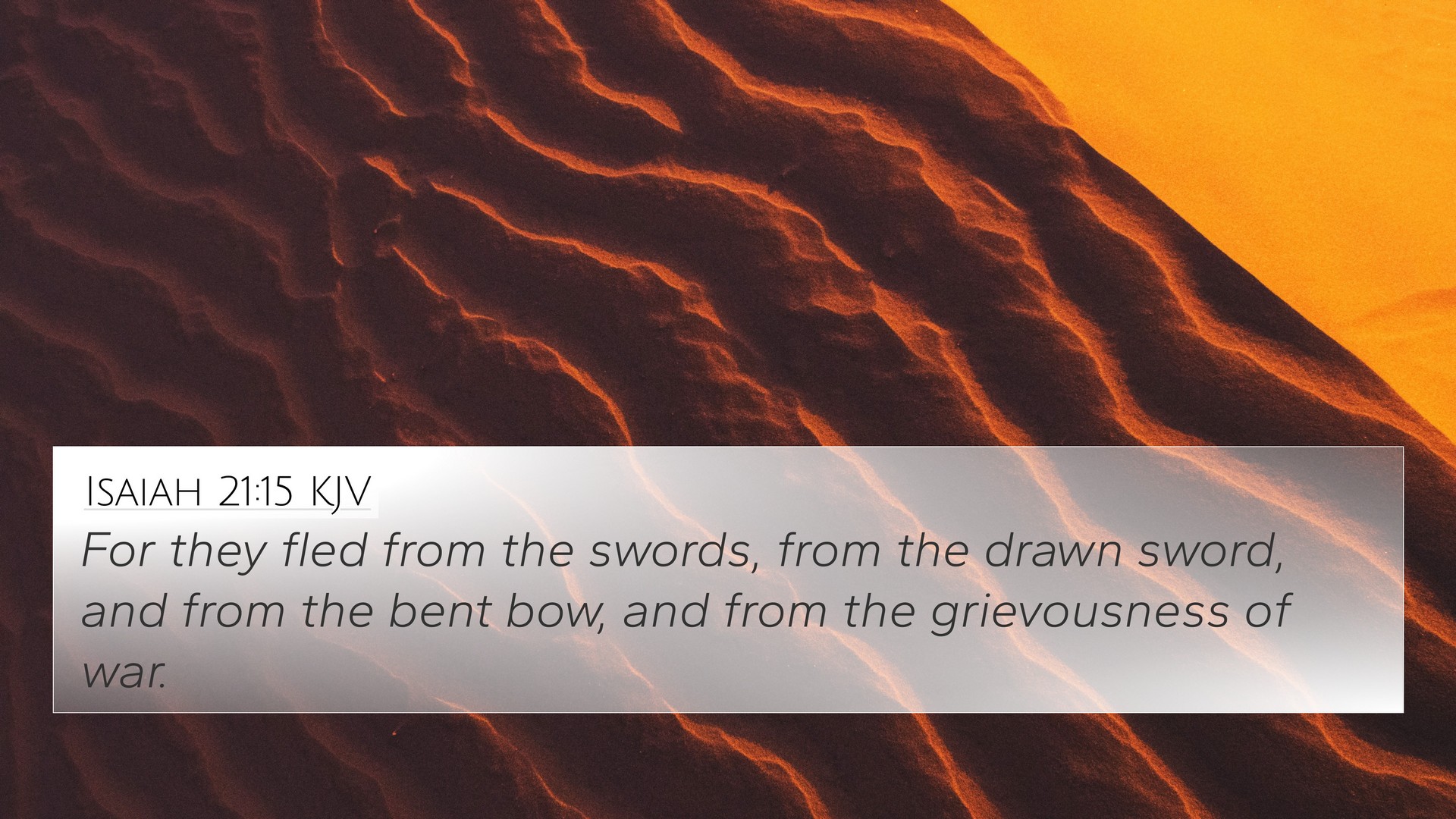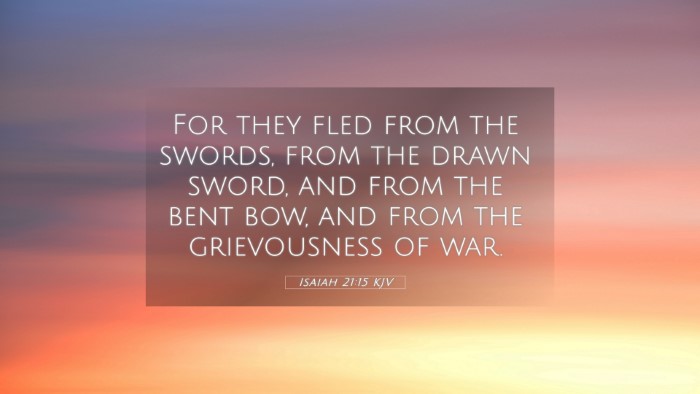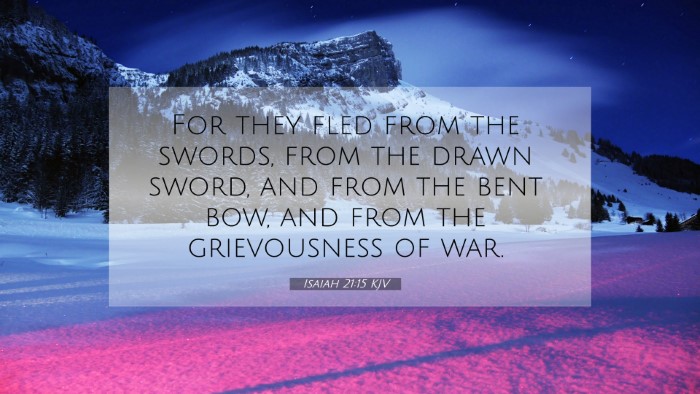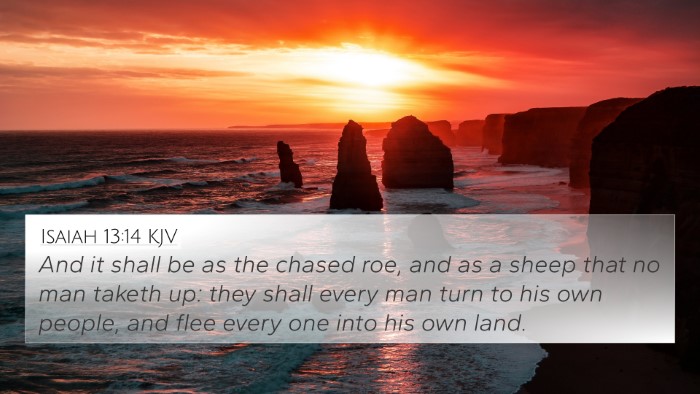Understanding Isaiah 21:15
Bible Verse: Isaiah 21:15 - "For they fled from the swords, from the drawn sword, and from the bent bow, and from the grievousness of war."
Context and Background
The Book of Isaiah, attributed to the prophet Isaiah son of Amoz, contains prophecies and judgments concerning Israel and the nations surrounding it. Isaiah 21 contains a prophecy regarding Babylon, highlighting the imminent threat from invading armies and the desolation that war brings.
Verse Meaning
This verse speaks to the fear and desperation of people when confronted by war. The imagery evokes a scene of chaos where individuals flee from various threats—swords, bows, and the horrors of combat. It emphasizes the seriousness of the conflict and the panic that such situations engender.
Commentary Insights
- Matthew Henry: Henry remarks that this verse depicts the panic of a doomed city, where inhabitants are overtaken by fear and flee without the means to defend themselves. This illustrates the futility of human strength against divine judgment.
- Albert Barnes: Barnes emphasizes the overwhelming nature of the conflict described. The fleeing represents not just physical escape but a spiritual reckoning as it highlights the consequences of turning from God and the ensuing devastation of sin.
- Adam Clarke: Clarke notes that the reference to the "bent bow" indicates the readiness for battle, while "grievousness of war" highlights not merely the physical but also the emotional devastation that warfare inflicts on a community.
Cross-References and Thematic Connections
This verse relates to a number of other Biblical texts that share thematic or contextual similarities. Below are some relevant cross-references that explore the dynamics of war, fear, and divine judgment:
- Jeremiah 46:5: "What do I see? They are terrified, they are retreating. Their mighty men are beaten down." - Further insight into the panic during warfare.
- Isaiah 13:16: "Their children also shall be dashed to pieces before their eyes; their houses shall be spoiled, and their wives ravished." - A depiction of the tragic consequences of warfare.
- Isaiah 33:7: "Behold, their valiant ones cry without; the ambassadors of peace shall weep bitterly." - This verse reflects the sorrow and distress brought by conflict.
- Psalm 46:9: "He makes wars cease to the end of the earth; He breaks the bow and shatters the spear; He burns the chariots with fire." - A reminder of God's sovereignty over war.
- Mica 5:9: "Your hand shall be lifted up against your adversaries, and all your enemies shall be cut off." - Illustrating God’s power in the face of war.
- Ezekiel 30:4: "And a sword shall come upon Egypt, and anguish shall be in Cush, when the slain shall fall." - Capturing the inevitability of divine judgment through violence.
- Hebrews 11:34: "They quenched the power of fire, escaped the edge of the sword, were made strong out of weakness, became mighty in war, put foreign armies to flight." - Counteracting the despair of flight with themes of courage and divine support.
- Matthew 24:6: "And you will hear of wars and rumors of wars. See that you are not alarmed, for this must take place, but the end is not yet." - Jesus’ words that echo the ongoing presence of fear in the face of impending conflict.
- Lamentations 3:47: "Pursuit and destruction have come upon us, devastation and ruin." - Echoing themes of fear and loss tied to warfare.
- Revelation 6:4: "And out came another horse, bright red. Its rider was permitted to take peace from the earth, so that people should slay one another." - A prophetic vision of widespread conflict reflective of the fears expressed in Isaiah.
Application and Reflection
Isaiah 21:15 serves as a reminder of the fragility of human peace and the consequences of disobedience and sin. In today's context, readers can reflect on the themes of fear and war and consider their personal responses to conflicts, both internal and external. The verse also prompts a deeper exploration of reliance on God as an anchor amidst chaos.
Tools for Cross-Referencing
For those seeking deeper understanding through comparative Bible verse analysis, consider utilizing:
- Bible concordance to identify themes.
- Bible cross-reference guide for linking scripture.
- Cross-reference Bible study techniques.
- Comprehensive Bible reference resources to explore thematic connections.
Conclusion
Isaiah 21:15 encapsulates a moment of fear resultant from war, while the surrounding verses and commentaries further enhance its meaning and application. It encourages believers to acknowledge the realities of conflict while seeking divine guidance and strength. Through tools for cross-referencing and a holistic approach to scripture, one can uncover the rich tapestry of connections woven throughout the Bible, enhancing both personal and communal understanding of God’s Word.




